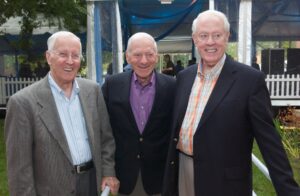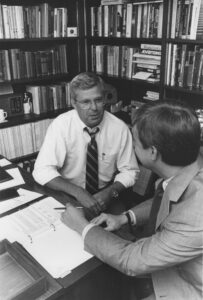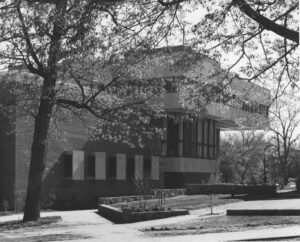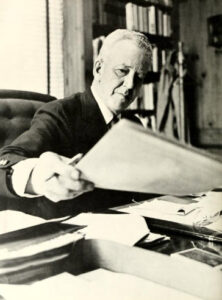News & Stories
Leaving a legacy of excellence

Serving as a business school dean – with its wide range of responsibilities and stakeholders – isn’t for the faint of heart. Today, serving in that role longer than six years is a rarity.
Maurice Lee – UNC’s fifth business school dean – served a remarkable 20 years, making him the longest serving dean in the Business School’s 100-plus year history.
Also remarkable is the lasting impact he made. His tenure from 1956 to 1976 was a key juncture in the development of business education in Chapel Hill. It covered a tumultuous period in U.S. history with major global, societal and cultural changes, including the Civil Rights Movement, Vietnam War, Cold War, Watergate, Cuban Missile Crisis, the assassination of President John F. Kennedy, the first moon landing and the Suez Crisis.
Yet, he set the stage for what is today a thriving UNC Kenan-Flagler Business School. His legacy includes hiring stellar faculty; embedding experiential learning into the curriculum; engaging with industry; leading the School’s first endowment drive; and expanding Carroll Hall, then home to the Business School.
Lee led the School into national prominence, says Operations Professor Emeritus Jack Evans, who Lee hired in 1970 and went on to serve as dean from 1979 to 1987 along with terms as interim dean. “No dean since has served for even half as long as he did. He increased the rate of our progress through his faculty hiring and thereby created a launching pad for all that followed. What he did is akin to the keystone in an arch.”
When Lee arrived in 1956, the School of Business Administration, as it was known then, had a strong undergraduate program, a one-year MBA Program, a doctoral program and the “Executive Program.”
Building faculty excellence
His enduring mark: building an all-star faculty who excel at both teaching and research, is a standard that continues today.
“He hired many faculty consistent with the objective of acquiring people who would be successful at both teaching and scholarship. By the time I joined the faculty, we already had such senior faculty as Harold Langenderfer, Rollie Tillman, DeWitt Dearborn, Dick Levin, Jack Behrman and John Pringle, Jay Klompmaker, Gerry Bell, Robert Headen and CL Kendall. They played a significant role in the School’s aspirations and determination to build a top-notch MBA program.

Tillman, Levin and Headen in 2011

Klopmaker
Other key senior faculty members who elevated the doctoral program included Stacy Adams, Avery Cohan, Henry Latané, Richard McEnally, Cliff Kreps, Bill Perreault, David Rubin, Ben Rosen, Fritz Russ, Doug Elvers and Curt McLaughlin.
They served for long periods of time, in some cases three decades and more. “That length of continuous service meant that many of them made multiple, important contributions and were part of sustaining a commitment to steady improvement in the strength of the faculty and the School’s programs.
He hired people who wanted to build the sort of faculty we have now, says Evans. “He led by the notion that each faculty hire should increase the strength of the School.”
Changing education
Under Lee’s leadership the number of faculty members with PhDs grew significantly, which built a strong foundation for research and better prepared PhD students to do rigorous research. They enhanced undergraduate teaching, particularly in accounting, and undertook a restructuring of the Full-Time MBA Program. It changed from a one- to two-year program, with the Class of 1968 the first to graduate, and grew enrollment by the mid-1970s.
They also built the foundation for the launch of the Master of Accounting Program in 1985.
Experiential learning became a cornerstone of the curriculum. Lee created a management simulation course that put senior business majors in charge of their own companies and forced them to make policy, investment and budget decisions as the course evolved through the semester.
His work as president of the Association to Advance Collegiate Schools of Business contributed much to the major curriculum advances of the 1960s. He is “widely acknowledged as a leader of thought on collegiate business education and has been primarily responsible for the preparation of the statement of standards governing undergraduate collegiate education for business in this country,” according to a 1957 Daily Tar Heel article.
Fundraising and facilities
Lee presided over the School’s first endowment drive, known as The Program for the Seventies. He hired Roy Holsten (BA ’50) as associate dean for external relations. Holsten played a significant role in developing the relationships that resulted in the successful fundraising campaign. Today, the highest honor for leadership and service at UNC Kenan-Flagler bears his name: the Roy W. Holsten Exceptional Service Award.
Lee also led the expansion of Carroll Hall in 1971 with an adjunct building behind and to the west of the original building. The addition was projected to cost $1.6 million when announced in 1969. It encompassed 56,000-square-feet and dwarfed the original 32,000-square-foot building, engulfing the original auditorium with a wrap-around design.

Expansion of Carroll Hall
Economics scholar
He had a commanding presence at 6-foot-4-inches and a mane of white hair. “He was tall, stately and reserved,” Evans says. “He had a commanding presence. He also had a sly sense of humor and enjoyed a laugh, but he was without frivolity. He just naturally drew respect.”
Lee had a PhD in economics from the University of Chicago. Affiliated with the National Bureau of Economic Research, his scholarship credentials were impeccable, says Evans.
“He was an excellent author and expositor on economic policy in the classroom and was particularly popular with those who attended the Executive Program,” says Evans. “I still encounter alumni who remember fondly taking his classes as either undergraduates or MBA students.”

Dean Lee in 1972
The mid-1970s saw the culmination of a multi-year effort from faculty members in the Department of Economics to gain more autonomy and resources within the School of Business Administration. Chancellor Ferebee Taylor launched a study in 1973 on the best fit for the economics program and a year later announced that economics would move out of business administration and become a department in the College of Arts and Sciences in 1974.
When he retired from the deanship two years later, Lee continued to teach in both economics and business for several years. He published five books and wrote numerous articles for business journals.
He also wrote “Economic Commentary,” a quarterly newsletter on macroeconomics and economic policy that was published three times a year for nearly a decade. His expertise was well-positioned during the 1970s’ rampant inflation and evolution of Reaganomics in the 1980s to offer analysis and opinion. His views and forecasts were regularly quoted, from The Daily Tar Heel to The New York Times.
When Lee died at 72 on March 16, 1985, the late UNC President William C. Friday described him “as a builder and a man who believed in standards. His influence in this state and this business community was far-reaching.”
He built a “school with a record of excellence which has quietly but effectively earned it national visibility,” according to an article written by the Business School when Lee retired as dean. “Maurice Lee is an individual whose integrity and personal strength enrich his students, colleagues and associates in education, business and government.”
It went on to credit “what has become a trademark of the UNC-CH School of Business Administration – an extremely close and mutually rewarding relationship with the business-industrial community. Such a relationship has a particular meaning in a university founded in the concept of service to its constituencies.”
His legacy as a leader, teacher, scholar and public servant left the Business School better in all dimensions to achieve what became an increasingly complex mission.
Read more about UNC Kenan-Flagler’s history in the book “UNC Kenan-Flagler: A Century of Tradition and Innovation.”